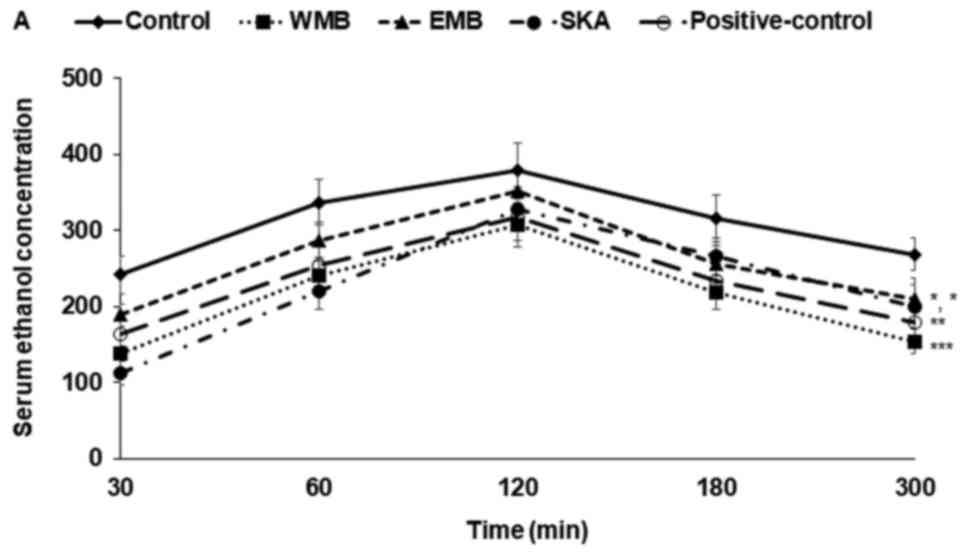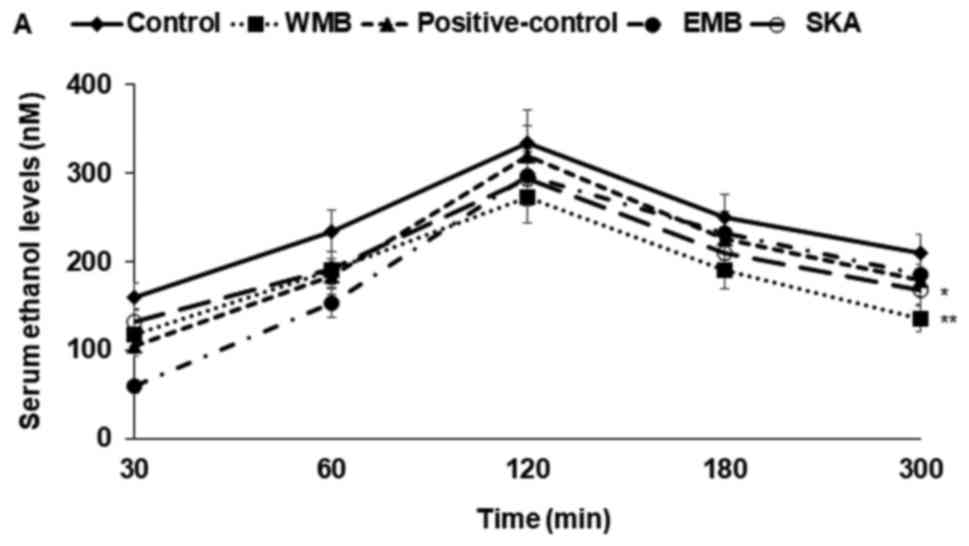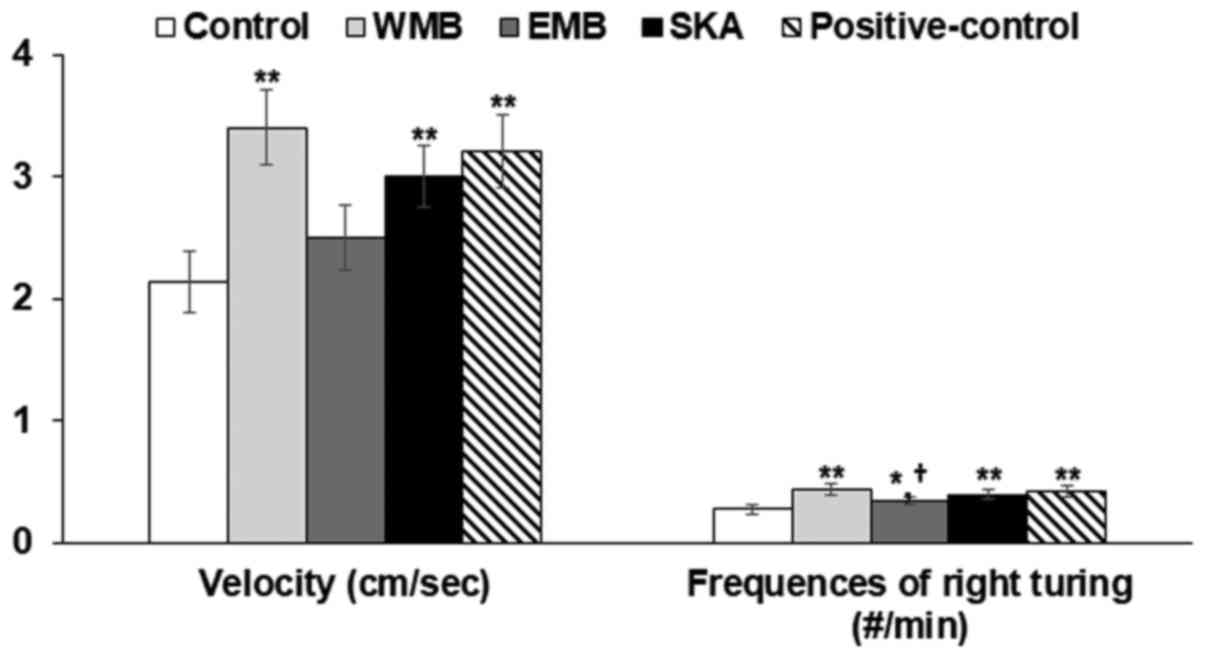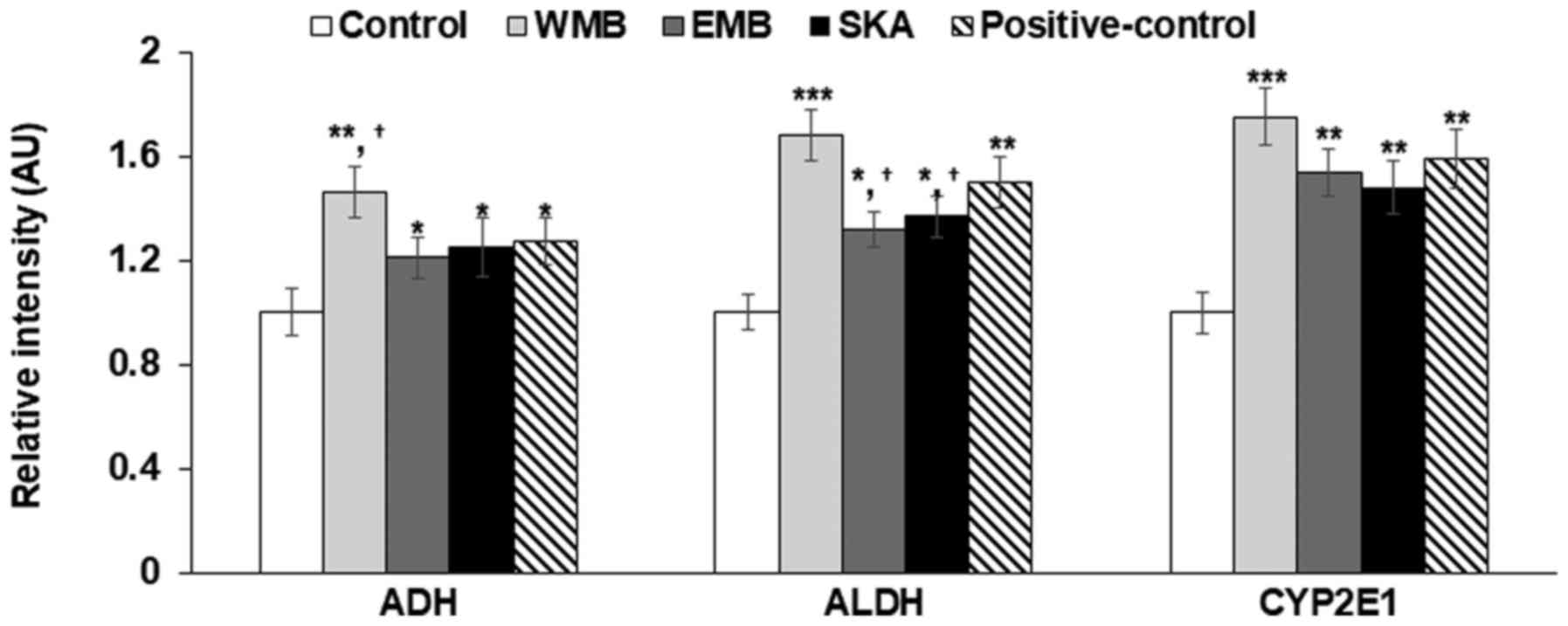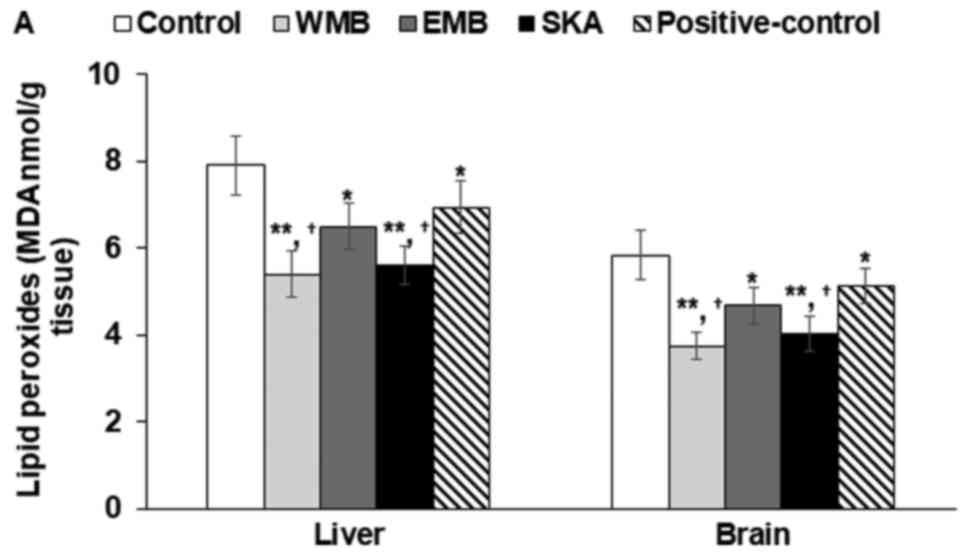|
1
|
Chi YC, Lee SL, Lai CL, Lee YP, Lee SP,
Chiang CP and Yin SJ: Ethanol oxidation and the inhibition by drugs
in human liver, stomach and small intestine: Quantitative
assessment with numerical organ modeling of alcohol dehydrogenase
isozymes. Chem Biol Interact. 258:134–141. 2016. View Article : Google Scholar : PubMed/NCBI
|
|
2
|
French SW: Chronic alcohol binging injures
the liver and other organs by reducing NAD+ levels
required for sirtuin's deacetylase activity. Exp Mol Pathol.
100:303–306. 2016. View Article : Google Scholar : PubMed/NCBI
|
|
3
|
Sung CK, Kim SM, Oh CJ, Yang SA, Han BH
and Mo EK: Taraxerone enhances alcohol oxidation via increases of
alcohol dehyderogenase (ADH) and acetaldehyde dehydrogenase (ALDH)
activities and gene expressions. Food Chem Toxicol. 50:2508–2514.
2012. View Article : Google Scholar : PubMed/NCBI
|
|
4
|
Shi P, Chen B, Chen C, Xu J, Shen Z, Miao
X and Yao H: Honey reduces blood alcohol concentration but not
affects the level of serum MDA and GSH-Px activity in intoxicated
male mice models. BMC Complement Altern Med. 15:2252015. View Article : Google Scholar : PubMed/NCBI
|
|
5
|
Younossi Z and Henry L: Contribution of
alcoholic and nonalcoholic fatty liver disease to the burden of
liver-related morbidity and mortality. Gastroenterology.
150:1778–1785. 2016. View Article : Google Scholar : PubMed/NCBI
|
|
6
|
Enrico P and Diana M: On the accuracy of
in vivo ethanol and acetaldehyde monitoring, a key tile in the
puzzle of acetaldehyde as a neuroactive agent. Front Behav
Neurosci. 11:972017. View Article : Google Scholar : PubMed/NCBI
|
|
7
|
Song BJ, Akbar M, Jo I, Hardwick JP and
Abdelmegeed MA: Translational implications of the
alcohol-metabolizing enzymes, including cytochrome P450-2E1, in
alcoholic and nonalcoholic liver disease. Adv Pharmacol.
74:303–372. 2015. View Article : Google Scholar : PubMed/NCBI
|
|
8
|
Polavarapu R, Spitz DR, Sim JE, Follansbee
MH, Oberley LW, Rahemtulla A and Nanji AA: Increased lipid
peroxidation and impaired antioxidant enzyme function is associated
with pathological liver injury in experimental alcoholic liver
disease in rats fed diets high in corn oil and fish oil.
Hepatology. 27:1317–1323. 1998. View Article : Google Scholar : PubMed/NCBI
|
|
9
|
Lee MH, Kwak JH, Jeon G, Lee JW, Seo JH,
Lee HS and Lee JH: Red ginseng relieves the effects of alcohol
consumption and hangover symptoms in healthy men: A randomized
crossover study. Food Funct. 5:528–534. 2014. View Article : Google Scholar : PubMed/NCBI
|
|
10
|
Lee HS, Isse T, Kawamoto T, Baik HW, Park
JY and Yang M: Effect of Korean pear (Pyruspyrifolia cv.
Shingo) juice on hangover severity following alcohol
consumption. Food Chem Toxicol. 58:101–106. 2013. View Article : Google Scholar : PubMed/NCBI
|
|
11
|
Yim DS, Lee KH, Jang IJ, Shin S, Lee YS
and Park SC: Effect of aspartate and asparagine on metabolism and
central nervous system effect of alcohol in healthy male
volunteers. Kor J Pharmacol. 31:261–269. 2009.
|
|
12
|
Ko BS, Jang JS, Hong SM, Kim DW, Sung SR,
Park HR, Lee JE, Jeon WK and Park S: Effect of new remedies mainly
comprised of Hovenia dulcis Thunb on alcohol degradation and
liver protection in Sprague Dawley male rats. J Korean Soc Food Sci
Nutr. 35:828–834. 2006. View Article : Google Scholar
|
|
13
|
Jiang Z, Chen C, Wang J, Xie W, Wang M, Li
X and Zhang X: Purple potato (Solanum tuberosum L.)
anthocyanins attenuate alcohol-induced hepatic injury by enhancing
antioxidant defense. J Nat Med. 70:45–53. 2016. View Article : Google Scholar : PubMed/NCBI
|
|
14
|
Hou Z, Qin P and Ren G: Effect of
anthocyanin-rich extract from black rice (Oryza sativa L.
Japonica) on chronically alcohol-induced liver damage in rats.
J Agric Food Chem. 58:3191–3196. 2010. View Article : Google Scholar : PubMed/NCBI
|
|
15
|
Li YG, Ji DF, Chen S and Hu GY: Protective
effects of sericin protein on alcohol-mediated liver damage in
mice. Alcohol Alcohol. 43:246–253. 2008. View Article : Google Scholar : PubMed/NCBI
|
|
16
|
Raghavendra R, Neelagund S, Kuluvar G,
Bhanuprakash V and Revanaiah Y: Protective effect of partially
purified 35 kDa protein from silk worm (Bombyx mori) fecal
matter against carbon tetrachloride induced hepatotoxicity and in
vitro anti-viral properties. Pharm Biol. 48:1426–1431. 2010.
View Article : Google Scholar : PubMed/NCBI
|
|
17
|
Andallu B and Varadacharyulu NC:
Gluconeogenic substrates and hepatic gluconeogenic enzymes in
streptozotocin-diabetic rats: Effect of mulberry (Morus
indica L.) leaves. J Med Food. 10:41–48. 2007. View Article : Google Scholar : PubMed/NCBI
|
|
18
|
Golub HM, Zhou QG, Zucker H, McMullen MR,
Kokiko-Cochran ON, Ro EJ, Nagy LE and Suh H: Chronic alcohol
exposure is associated with decreased neurogenesis, aberrant
integration of newborn neurons, and cognitive dysfunction in female
mice. Alcohol Clin Exp Res. 39:1967–1977. 2015. View Article : Google Scholar : PubMed/NCBI
|
|
19
|
Park S, Kim DS, Kang S and Shin BK:
Synergistic topical application of salt-processed Phellodendron
amurense and Sanguisorba officinalis Linne alleviates atopic
dermatitis symptoms by reducing levels of immunoglobulin E and
pro-inflammatory cytokines in NC/Nga mice. Mol Med Rep.
12:7657–7664. 2015. View Article : Google Scholar : PubMed/NCBI
|
|
20
|
Tripathi T, Abdi M and Alizadeh H:
Protease-activated receptor 2 (PAR2) is upregulated by Acanthamoeba
plasminogen activator (aPA) and induces proinflammatory cytokine in
human corneal epithelial cells. Invest Ophthalmol Vis Sci.
55:3912–3921. 2014. View Article : Google Scholar : PubMed/NCBI
|
|
21
|
Livak KJ and Schmittgen TD: Analysis of
relative gene expression data using real-time quantitative PCR and
the 2(-Delta Delta C(T)) method. Methods. 25:402–408. 2001.
View Article : Google Scholar : PubMed/NCBI
|
|
22
|
Fernández-Checa JC: Alcohol-induced liver
disease: When fat and oxidative stress meet. Ann Hepatol. 2:69–75.
2003.PubMed/NCBI
|
|
23
|
Yang HJ, Kim MJ, Kwon DY, Kang ES, Kang S
and Park S: Gastroprotective actions of Taraxacum coreanum Nakai
water extracts in ethanol-induced rat models of acute and chronic
gastritis. J Ethnopharmacol. 208:84–93. 2017. View Article : Google Scholar : PubMed/NCBI
|
|
24
|
Wall TL, Luczak SE and Hiller-Sturmhöfel
S: Biology, genetics, and environment: underlying factors
influencing alcohol metabolism. Alcohol Res. 38:59–68.
2016.PubMed/NCBI
|
|
25
|
Cha JY, Jung HJ, Jeong JJ, Yang HJ, Kim YT
and Lee YS: Effects of amino acids on the activities of alcohol
metabolizing enzyme alcohol dehydrogenase (ADH) and acetaldehyde
dehydrogenase (ALDH). J Life Sci. 19:pp1321–1327. 2009. View Article : Google Scholar
|
|
26
|
Raman ST, Ganeshan AK, Chen C, Jin C, Li
SH, Chen HJ and Gui Z: In vitro and in vivo antioxidant activity of
flavonoid extracted from mulberry fruit (Morus alba L.).
Pharmacogn Mag. 12:128–133. 2016. View Article : Google Scholar : PubMed/NCBI
|
|
27
|
Kim JW, Kim TB, Kim HW, Park SW, Kim HP
and Sung SH: Hepatoprotective flavonoids in Opuntia ficus-indica
fruits by reducing oxidative stress in primary rat hepatocytes.
Pharmacogn Mag. 13:472–476. 2017. View Article : Google Scholar : PubMed/NCBI
|
|
28
|
Valenti L, Riso P, Mazzocchi A, Porrini M,
Fargion S and Agostoni C: Dietary anthocyanins as nutritional
therapy for nonalcoholic fatty liver disease. Oxid Med Cell Longev.
2013:1454212013. View Article : Google Scholar : PubMed/NCBI
|
|
29
|
Swift R and Davidson D: Alcohol hangover:
Mechanisms and mediators. Alcohol Health Res World. 22:54–60.
1998.PubMed/NCBI
|
|
30
|
Mitchell MC Jr, Teigen EL and Ramchandani
VA: Absorption and peak blood alcohol concentration after drinking
beer, wine, or spirits. Alcohol Clin Exp Res. 38:1200–1204. 2014.
View Article : Google Scholar : PubMed/NCBI
|
|
31
|
Ampawong S, Isarangkul D and Aramwit P:
Sericin ameliorated dysmorphic mitochondria in high-cholesterol
diet/streptozotocin rat by antioxidative property. Exp Biol Med
(Maywood). 242:411–421. 2017. View Article : Google Scholar : PubMed/NCBI
|
|
32
|
Lee SH, Park D, Yang G, Bae DK, Yang YH,
Kim TK, Kim D, Kyung J, Yeon S, Koo KC, et al: Silk and silkworm
pupa peptides suppress adipogenesis in preadipocytes and fat
accumulation in rats fed a high-fat diet. Eur J Nutr. 51:1011–1019.
2012. View Article : Google Scholar : PubMed/NCBI
|
|
33
|
Okazaki Y, Kakehi S, Xu Y, Tsujimoto K,
Sasaki M, Ogawa H and Kato N: Consumption of sericin reduces serum
lipids, ameliorates glucose tolerance and elevates serum
adiponectin in rats fed a high-fat diet. Biosci Biotechnol Biochem.
74:1534–1538. 2010. View Article : Google Scholar : PubMed/NCBI
|
|
34
|
Wu KL, Chaikomin R, Doran S, Jones KL,
Horowitz M and Rayner CK: Artificially sweetened versus regular
mixers increase gastric emptying and alcohol absorption. Am J Med.
119:802–804. 2006. View Article : Google Scholar : PubMed/NCBI
|
|
35
|
Bustamante J, Karadayian AG, Lores-Arnaiz
S and Cutrera RA: Alterations of motor performance and brain cortex
mitochondrial function during ethanol hangover. Alcohol.
46:473–479. 2012. View Article : Google Scholar : PubMed/NCBI
|
|
36
|
Yoo YM, Jung EM, Kang HY, Choi IG, Choi KC
and Jeung EB: The sap of Acer okamotoanum decreases serum alcohol
levels after acute ethanol ingestion in rats. Int J Mol Med.
28:489–495. 2011.PubMed/NCBI
|
|
37
|
Asorey LG, Carbone S, Gonzalez BJ and
Cutrera RA: Behavioral effects of the combined use of alcohol and
energy drinks on alcohol hangover in an experimental mice model.
Neurosci Lett. 670:1–7. 2018. View Article : Google Scholar : PubMed/NCBI
|
|
38
|
Chen Y, Dong H, Thompson DC, Shertzer HG,
Nebert DW and Vasiliou V: Glutathione defense mechanism in liver
injury: Insights from animal models. Food Chem Toxicol. 60:38–44.
2013. View Article : Google Scholar : PubMed/NCBI
|
|
39
|
Srikanta AH, Kumar A, Sukhdeo SV, Peddha
MS and Govindaswamy V: The antioxidant effect of mulberry and jamun
fruit wines by ameliorating oxidative stress in
streptozotocin-induced diabetic Wistar rats. Food Funct.
7:4422–4431. 2016. View Article : Google Scholar : PubMed/NCBI
|
|
40
|
Wu T, Yin J, Zhang G, Long H and Zheng X:
Mulberry and cherry anthocyanin consumption prevents oxidative
stress and inflammation in diet-induced obese mice. Mol Nutr Food
Res. 60:687–694. 2016. View Article : Google Scholar : PubMed/NCBI
|
|
41
|
Wen DC, Hu XY, Wang YY, Luo JX, Lin W, Jia
LY and Gong XY: Effects of aqueous extracts from Panax ginseng and
Hippophae rhamnoides on acute alcohol intoxication: An experimental
study using mouse model. J Ethnopharmacol. 192:67–73. 2016.
View Article : Google Scholar : PubMed/NCBI
|
|
42
|
Deehan GA Jr, Hauser SR, Wilden JA, Truitt
WA and Rodd ZA: Elucidating the biological basis for the
reinforcing actions of alcohol in the mesolimbic dopamine system:
The role of active metabolites of alcohol. Front Behav Neurosci.
7:1042013. View Article : Google Scholar : PubMed/NCBI
|
|
43
|
Deehan GA Jr, Engleman EA, Ding ZM,
McBride WJ and Rodd ZA: Microinjections of acetaldehyde or
salsolinol into the posterior ventral tegmental area increase
dopamine release in the nucleus accumbens shell. Alcohol Clin Exp
Res. 37:722–729. 2013. View Article : Google Scholar : PubMed/NCBI
|
|
44
|
Salaspuro M: Acetaldehyde as a common
denominator and cumulative carcinogen in digestive tract cancers.
Scand J Gastroenterol. 44:912–925. 2009. View Article : Google Scholar : PubMed/NCBI
|















